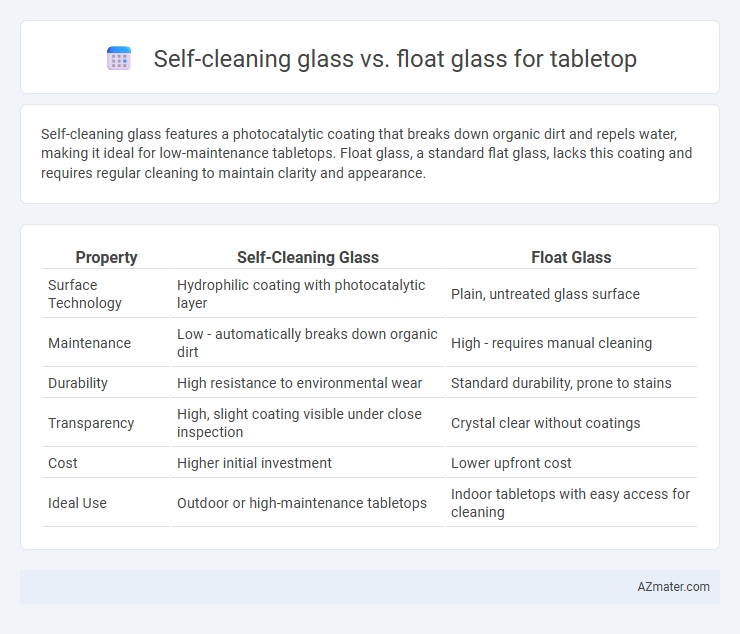Self-cleaning glass features a photocatalytic coating that breaks down organic dirt and repels water, making it ideal for low-maintenance tabletops. Float glass, a standard flat glass, lacks this coating and requires regular cleaning to maintain clarity and appearance.
Table of Comparison
| Property | Self-Cleaning Glass | Float Glass |
|---|---|---|
| Surface Technology | Hydrophilic coating with photocatalytic layer | Plain, untreated glass surface |
| Maintenance | Low - automatically breaks down organic dirt | High - requires manual cleaning |
| Durability | High resistance to environmental wear | Standard durability, prone to stains |
| Transparency | High, slight coating visible under close inspection | Crystal clear without coatings |
| Cost | Higher initial investment | Lower upfront cost |
| Ideal Use | Outdoor or high-maintenance tabletops | Indoor tabletops with easy access for cleaning |
Introduction to Self-Cleaning Glass and Float Glass
Self-cleaning glass features a hydrophilic coating that breaks down organic dirt and allows water to spread evenly, facilitating easier cleaning and maintaining clear visibility. Float glass, produced by floating molten glass on a bed of molten metal, offers a smooth surface and uniform thickness widely used in tabletops for its clarity and durability. Comparing the two, self-cleaning glass provides low-maintenance advantages while float glass serves as a versatile, cost-effective option.
What Is Float Glass?
Float glass is a type of flat glass produced by floating molten glass on a bed of molten metal, typically tin, resulting in a uniform thickness and smooth surface ideal for tabletops. It offers excellent clarity and strength but requires regular cleaning due to its standard glass surface that attracts fingerprints and smudges. Unlike float glass, self-cleaning glass features a special coating that breaks down organic dirt and allows rainwater to rinse away residues, reducing maintenance efforts for tabletop applications.
Understanding Self-Cleaning Glass Technology
Self-cleaning glass for tabletops utilizes a special photocatalytic coating, typically titanium dioxide, that breaks down organic dirt when exposed to UV light, reducing the need for manual cleaning. Unlike standard float glass, which is untreated and requires regular maintenance, self-cleaning glass enhances durability and clarity by actively repelling contaminants and minimizing water marks. This advanced technology improves long-term aesthetics and hygiene for tabletops, making it ideal for both residential and commercial environments.
Key Differences Between Self-Cleaning and Float Glass
Self-cleaning glass features a special coating that breaks down organic dirt using UV rays and repels water, reducing maintenance for tabletops, whereas float glass is untreated and requires regular cleaning to maintain clarity. The coating on self-cleaning glass enhances durability and keeps surfaces clearer longer, making it ideal for high-use or outdoor tabletops. Float glass offers a cost-effective option but lacks the advanced functionality of self-cleaning glass, leading to more frequent cleaning and potential surface wear.
Durability and Safety: Which Is More Robust?
Self-cleaning glass for tabletops often features a durable coating that resists stains and scratches, enhancing longevity compared to standard float glass. Float glass, while commonly used, lacks this protective layer and is more prone to surface damage over time. Safety-wise, both types can be tempered or laminated to improve impact resistance, but self-cleaning glass coatings do not compromise these structural reinforcements, making it equally robust for everyday use.
Maintenance Requirements and Ease of Cleaning
Self-cleaning glass for tabletops features a special coating that breaks down organic dirt and repels water, significantly reducing maintenance requirements compared to float glass. Float glass, without this advanced coating, often requires regular manual cleaning and more frequent use of cleaning agents to maintain clarity and hygiene. The ease of cleaning self-cleaning glass translates to less effort and time spent on upkeep, making it ideal for high-use tables where low maintenance is a priority.
Aesthetic Appeal and Visual Clarity
Self-cleaning glass offers superior aesthetic appeal and visual clarity for tabletops by minimizing water spots, dirt, and smudges, maintaining a consistently clean surface with minimal maintenance. In contrast, float glass requires frequent cleaning to preserve its clarity and is more prone to showing fingerprints and stains, which can detract from the overall look. The advanced titanium dioxide coating on self-cleaning glass enhances light transmission and reduces glare, providing a sleek and visually appealing finish ideal for modern tabletop designs.
Environmental Impact and Sustainability
Self-cleaning glass for tabletops reduces the need for chemical cleaners and water usage, significantly lowering environmental pollution compared to traditional float glass. Its photocatalytic coating helps break down organic matter, enhancing sustainability by minimizing maintenance frequency and extending the product's lifespan. Float glass, though widely used and recyclable, lacks these eco-friendly properties and requires more frequent cleaning with potentially harmful substances.
Cost Comparison: Upfront and Long-Term Value
Self-cleaning glass for tabletops generally has a higher upfront cost due to advanced coatings that repel dirt and reduce cleaning frequency, while float glass offers a more affordable initial investment but requires regular maintenance. Over time, self-cleaning glass can provide long-term value by minimizing cleaning expenses and preserving clarity, making it suitable for high-visibility or hard-to-reach surfaces. Float glass remains cost-effective for budget-conscious users but may incur additional labor and cleaning product costs throughout its lifespan.
Choosing the Best Tabletop Glass for Your Needs
Self-cleaning glass for tabletops incorporates a special coating that breaks down organic dirt using sunlight and repels water to reduce manual cleaning, making it ideal for busy environments or outdoor use. Float glass, known for its smooth, flat surface and clarity, is cost-effective and versatile but requires regular maintenance to keep its pristine appearance. When choosing the best tabletop glass, consider factors such as ease of maintenance, exposure to environmental elements, cost, and the desired aesthetic to determine whether the advanced functionality of self-cleaning glass or the classic look of float glass suits your needs.

Infographic: Self-cleaning glass vs Float glass for Tabletop
 azmater.com
azmater.com